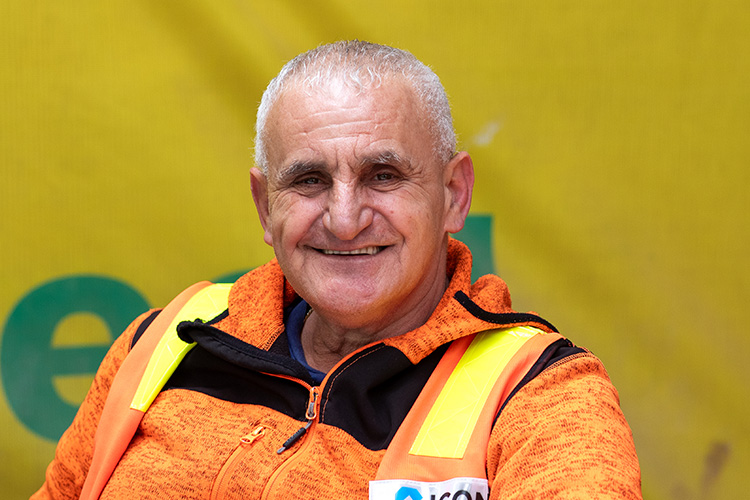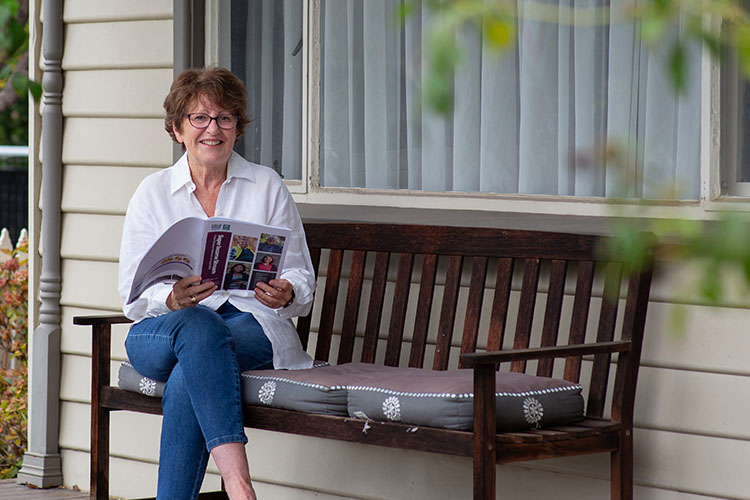Retirement
Transition to Retirement
A Transition to Retirement (TTR) account is for people 60-64 starting to access their super. Use it to work less or save more for retirement.
Read more...A Fully Retired account lets you have a steady income after you've stopped working completely, or are still working a few hours after you've turned 65.
Read the transcript
If you're getting ready to retire, our super income stream, or SIS for short, might be perfect for you.
A Cbus super income stream is like having a steady pay check after you've stopped working.
It lets you take all the super you've worked hard to save and uses it as a regular income stream.
A Fully Retired SIS account offers flexible options to suit your lifestyle, such as choosing how much to withdraw, when, and how often.
Keeping your super invested means it can continue growing while you withdraw from it, and it comes with significant tax benefits, such as paying zero tax once you've reached 60 years of age, and you also pay no tax on your investment earnings. That's what we call a win-win.
Getting started with a SIS account is simple.
First, you need to have reached preservation age, which is a fancy way of saying the age you retire.
Depending on your date of birth, your preservation age will range from 55 to 60.
Knowing where to begin with retirement options can seem complicated and overwhelming.
We recommend speaking to us about how you can manage a super income stream with your lifestyle, including how it can work with the Age Pension.
Reach out to Advice services on 1300 361 784. It's included as part of your Cbus membership. And to read more, head to cbussuper.com.au/sis.
Cbus, making hard work pay off.
Get a regular income from your super if you're:
Income payments and investment earning are tax-free.
You may be eligible for an income stream tax refund when you open a Fully Retired account.
Draw a minimum of your balance each year, based on your age.
No maximum withdrawal limits.
Access lump sum withdrawals as you need them.
Choose from a range of investment options to keep your super working hard.
When you open your account, decide how much you want to get as a regular payment and how often.
You can change the amount and timing of payments at any time. Your payment amount needs to be above the minimum government limits.
Regular payments are sent to your chosen bank account.
The rest of your balance stays invested, less fees, income payments, withdrawals and tax (if applicable).
You’ll get payments until the money in your account runs out.
When you die, any remaining balance of your account may be paid to your beneficiaries as a cash payment or regular income.
A Fully Retired account is a very flexible way to access your super:
For income payments:
For lump sums:
Your income payments will be sent to the bank account you choose when you open a Fully Retired account.
You can choose to be paid:
| Age | Minimum annual payment |
|---|---|
| Under 65 years | 4% |
| 65 - 74 years | 5% |
| 75 - 79 years | 6% |
| 80 - 84 years | 7% |
| 85 - 89 years | 9% |
| 90 - 94 years | 11% |
| 95+ years | 14% |

Ben is 67 and is about to retire.
He has $310,000 saved in his super. Ben would like a retirement income of $46,000 a year until age 92.
Based on his financial situation, Ben’s Cbus financial adviser lets him know he could:
This would give Ben a total retirement income of just over $46,000 a year.

Emma is also 67 and about to retire.
She has $420,000 saved in her super. She also has $100,000 in her bank account and an investment property valued at $600,000. Emma would like a retirement income of $40,000 a year until age 92.
Speaking to her Cbus financial adviser, Emma learns she could:
This would give Emma a total retirement income of $40,000 a year without selling her investment property or reducing her bank account.
She wouldn’t qualify for the Age Pension because the value of her assets is too high. She may qualify for the Commonwealth Seniors Health Card.
*These examples are provided for illustration purposes only and are not intended to replace financial advice. This information doesn’t represent the benefits that you could receive or the fees and costs you may pay - the outcome will depend on your personal circumstances.
Source: Cbus Super Retirement income calculator available at cbussuper.com.au/calculators (accessed 6 August 2025).
Assumptions: Results are shown in today’s dollars assuming a 2.5% p.a. rise in the cost of living (inflation) and wage inflation of 3.7% p.a. The 5.25% p.a. investment return used in the calculation for the drawdown phase, is based on the Conservative Growth (super income stream) investment objective of CPI + 2.75% p.a., assuming CPI of 2.5% p.a, gross of tax and after investment fees and indirect costs. They are not guaranteed rates of return. Past performance is not a reliable indicator of future performance. Age Pension payments have been calculated assuming a homeowner with $10,000 contents, $20,000 car and a $20,000 bank account unless stated otherwise. Age Pension payments have been calculated based on the rates applicable from June 2025, and maximum rates are assumed to increase with price inflation for the period during retirement. These rates may have increased after this document was printed. Check servicesaustralia.gov.au/age-pension for current rates.
Tax-free income payments and investment earnings
Generally, no tax is payable when you transfer your money into a Super Income Stream. There's also no tax on your investment earnings in the Fully Retired account.
If you’re age 60 or over, the Super Income Stream payments you receive are tax -free.
You may be eligible for an income stream tax refund
If you're using an existing Cbus Super or Transition to Retirement account to start your Fully Retired account, we will refund money we’ve held from your account that would have been paid as tax.
If you’re eligible, the amount will be automatically credited to your new account the day it is opened. Read the Income Stream tax refund fact sheet (PDF) for details.
Before you transfer your balance to a Fully Retired account, contact us if you think you might be close to your personal transfer balance cap.
To find out how much you could receive, call us on 1300 361 784 to request a balance quote. Our consultants can provide guidance on what may suit you and your circumstances.
If you are over age 60, login to the Member portal and go to the Balance quote page.
How to claim a tax deduction
To claim a tax deduction for personal contributions to super, you need to do this before you transfer any money out of your super account.
Please note that:
To claim a tax deduction:
Before you open a Fully Retired account, make sure you understand all about it. Here's what you'll need to be across:
Our calculators can help you understand how to maximise your super and plan for retirement.
The rules and conditions around the Fully Retired account are complex. Especially around tax.
Our financial advisers can help you make confident choices about retirement.
Our in-person seminars and online webinars can help you get the most out of your super and plan for retirement.
What do I need to open a Fully Retired account?
To open a Fully Retired account:
Can a Fully Retired account work with the Age Pension?
When you get income payments from your super, you may still be eligible for the government Age Pension.
Find out if you’re eligible for the Age Pension and how much you could get.
Are there limits on how much I can invest?
Yes, there are limits on how much you can invest in a Fully Retired account.
The government has limited the amount of super you can transfer into tax-free retirement accounts to $2 million, if you're starting your first retirement income stream account in or after the 2025/26 financial year.
This is called the transfer balance cap. The cap is a lifetime limit on how much you can put into tax-free retirement accounts, pensions and annuities, with Cbus and any other super funds.
You may get tax penalties if you go over the cap. Any amount over the cap will need to be withdrawn or transferred to another super account. You can find your personal transfer balance cap by logging into myGov and going to the ATO site.
This limit doesn’t apply to super that you transfer into the Transition to Retirement (TTR) account.
How do I manage my Fully Retired account?
To manage your Fully Retired account login to the Member portal.
Can I add more to my Fully Retired account?
Once you’ve opened a Fully Retired account, you can’t add any more money to it. If you’d like to add more, you’ll need to open a new Fully Retired account.
We can help you with this process. Contact us to find out more.
How long will my Fully Retired account last?
There's no guarantee that your Fully Retired account will last as long as you do.
How long your account lasts will depend on:
What will my investment returns be?
Your investment returns will depend on the Fully Retired investment option that you choose. Like all investments, the returns may go up or down, depending on the conditions in market.
Make sure you consider your investment options carefully. If you need some help choosing, our Advice team is here to help.
I'm 60-64 and still working. Can I open a Super Income Stream account?
If you're 60-64 and still working, the Transition to Retirement (TTR) account may be for you. With a TTR account, you can access your super while you’re still working.
To be eligible, you need to be between preservation age (60) and 64. While you’re working, any super contributions will continue to be paid into your Cbus accumulation super account.
You can use a TTR acount to:
Learn more about the TTR account.